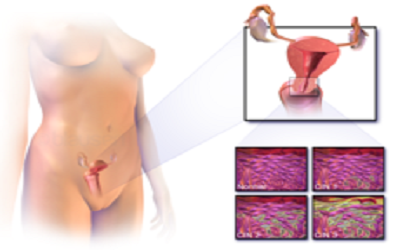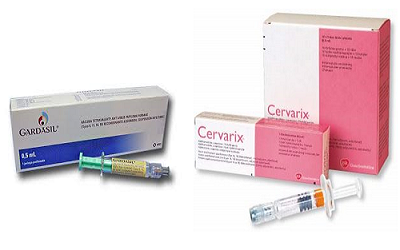Cervix Cancer :
Cervical cancer is a cancer arising from the cervix. It is due to the abnormal growth of cells that have the ability to invade or spread to other parts of the body. Cervical cancer typically develops from precancerous changes over 10 to 20 years.
Cervical Cancer symptoms may include:
1. abnormal vaginal bleeding.
2. pelvic pain.
3. pain during sexual intercourse.
Human papillomavirus (HPV) infection appears to be involved in the development of more than 90% of cases, most people who have had HPV infections, however, do not develop cervical cancer.

Other risk factors include : smoking, a weak immune system, birth control pills, starting sex at a young age and having many sexual partners. There are a few types of cervical cancer. About 90% are squamous cell carcinomas, 10% are adenocarcinoma and a small number are other types.
Other methods of prevention include: never having sex or having few sexual partners and the use of condoms. Cervical cancer screening using the Pap smear or acetic acid can identify precancerous changes which when treated can prevent the development of cancer. Treatment of cervical cancer may consist of some combination of surgery, chemotherapy and radiotherapy.
Cervical Cancer Vaccination :
Human papilloma virus (HPV) vaccines may prevent infections by certain types of human papillomavirus which are associated with the development of cervical cancer, genital warts, and other cancers. HPV vaccines protect against two high-risk strains of this family of viruses and may prevent up to 65 to 75% of cervical cancers.
Various strains of HPV, which spread through sexual contact, cause most cases of cervical cancer. Two cervical cancer vaccines have Food and Drug Administration (FDA) approval in the U.S. – Gardasil, for girls and boys, and Cervarix, for girls only. Both vaccines can prevent most cases of cervical cancer if given before a girl or woman is exposed to the virus. In addition, both can prevent vaginal and vulvar cancer in women, and Gardasil can prevent genital warts and anal cancer in women and men. In theory, vaccinating boys against HPV might also help protect girls from the virus by possibly decreasing transmission.
The cervical cancer vaccine is recommended for girls and boys ages 11 to 12, although it can be given as early as age 9. It’s important for girls and boys to receive the vaccine before they have sexual contact and are exposed to HPV. Once infected with HPV, the vaccine might not be as effective or might not work at all. Also, response to the vaccine is better at younger ages than it is at older ages.

If the three-dose series of vaccines isn’t completed by ages 11 to 12, the Centers for Disease Control and Prevention (CDC) recommends that girls and women through age 26 and boys and men through age 21 receive the vaccine. However, men can receive the HPV vaccine through age 26 if desired. Both vaccines are given as a series of three injections over a six-month period. The second dose is given one to two months after the first dose, and the third dose is given six months after the first dose.


